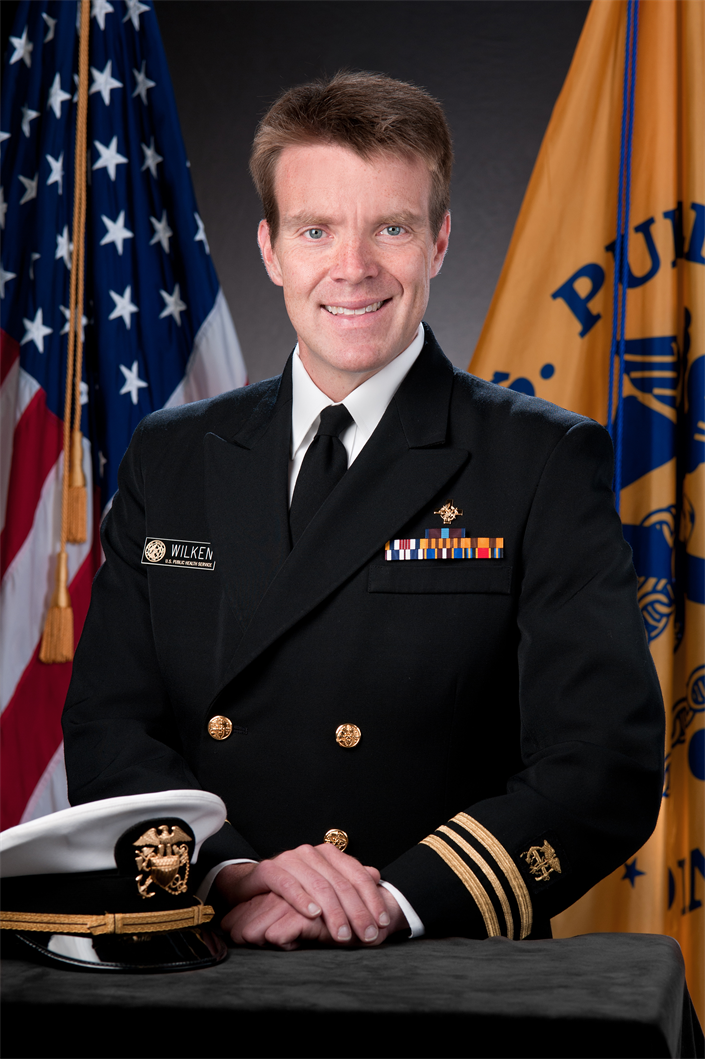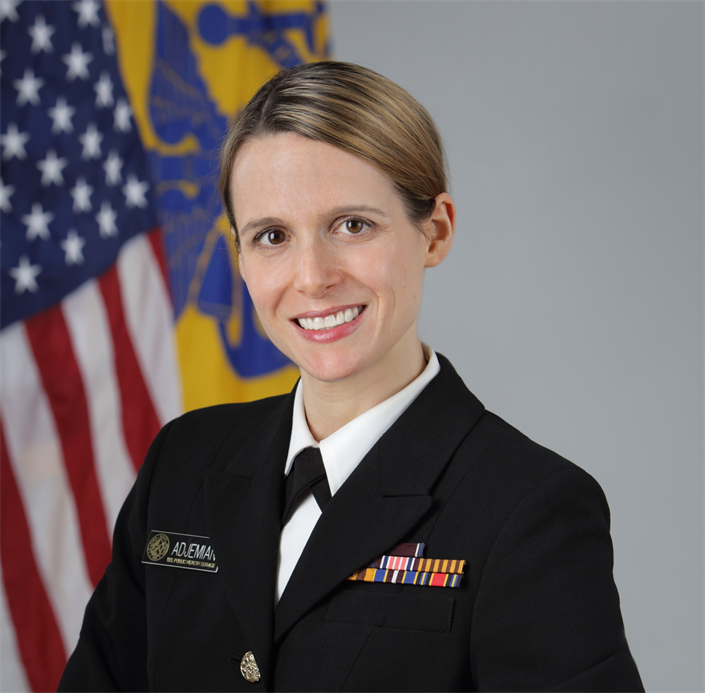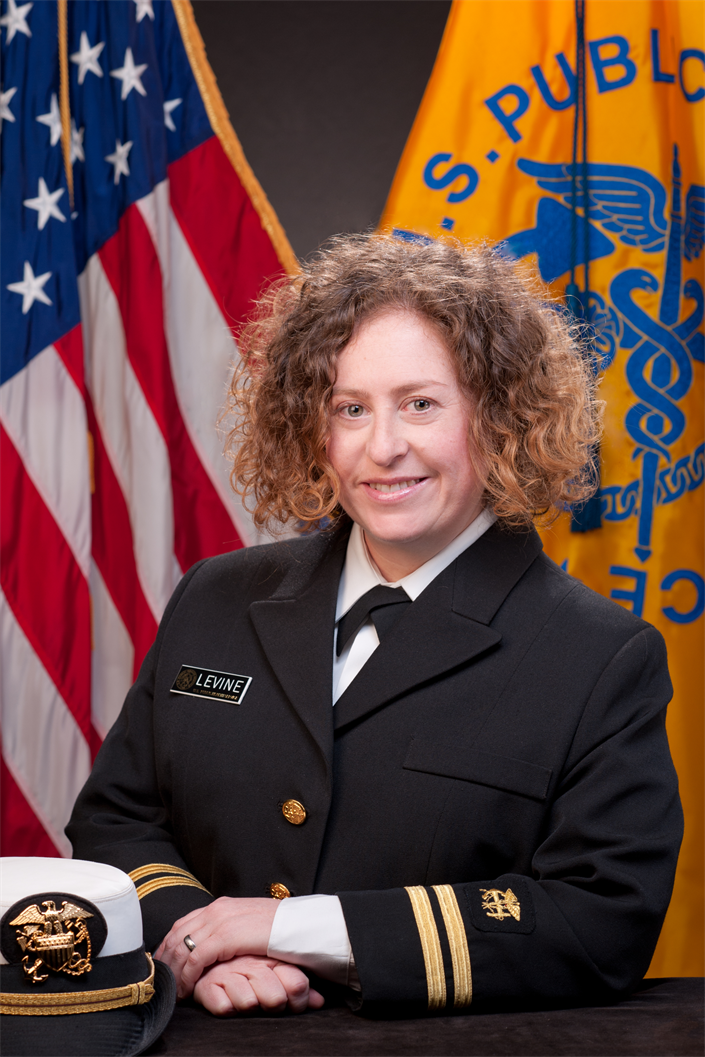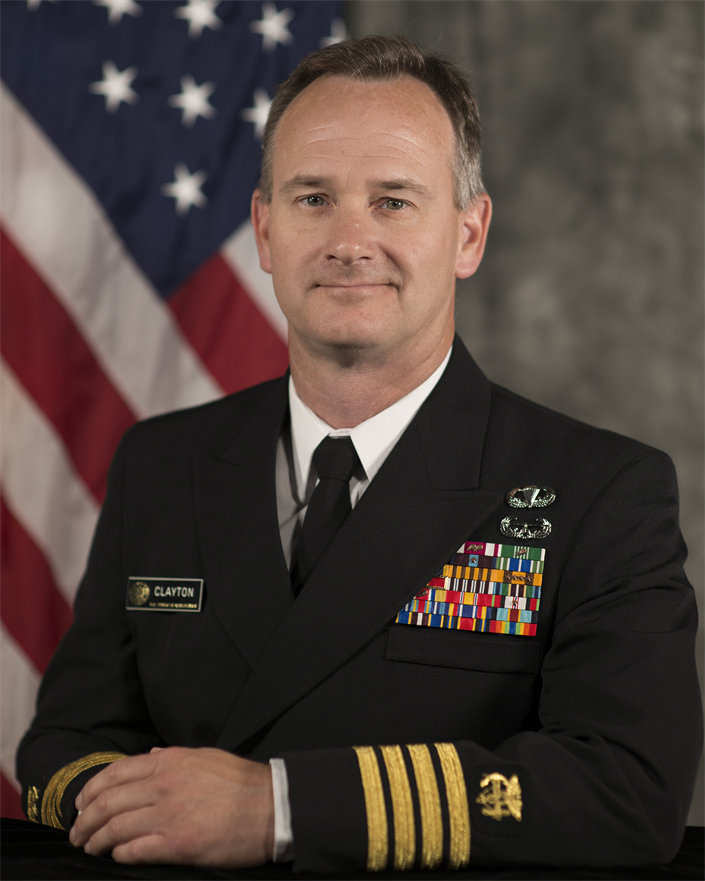2018 Junior Scientist Officer of the Year Award Winner
LCDR Jason Wilken

LCDR Wilken is a CDC Career Epidemiology Field Officer (CEFO) assigned to the California Department of Public health (CDPH). He leads CDPH’s disaster epidemiology efforts serves as a Director/Manager of the Medical and Health Coordination Center (MHCC; the joint emergency coordination center for CDPH and the Emergency Medical Services Agency), and leads investigations of state and national urgency.
LCDR Wilken commissioned in 2012 through the CDC’s two-year Epidemic Intelligence Service (EIS) fellowship. His premier project as an EIS Officer was an investigation of a large outbreak of Valley fever (coccidioidomycosis) in occupational settings. His findings provided the first evidence of effective prevention methods and led the California Occupational Safety and Health Administration (Cal/OSHA) to produce their first ever Valley Fever enforcement actions to prevent occupational-related illness, a precedent that serves as the foundation for Cal/OSHA’s current Valley Fever enforcement policies.
In his current role as a CDC CEFO, LCDR Wilken’s efforts include: serving as a Director/Manager of the MHCC during the 2017 wildfires in northern and southern California; building disaster epidemiology capacity by training >200 key preparedness, response, and epidemiology staff on CDC’s Community Assessment for Public Health Emergency Response (CASPER) rapid needs assessment; leading CDPH’s response to the historic 2012–2016 California drought (his efforts were the first to characterize public health impacts of severe drought in the United States, particularly in defining behavioral health impacts); designing standards adopted by the CDC’s Model Aquatic Health Code to prevent toxic chemical exposures at aquatic venues; and identifying an outbreak of pneumococcal disease among unaccompanied children in California, resulting in an expanded vaccination policy for unaccompanied children.
LCDR Wilken deploys without hesitation for emergency responses as well, as evidenced by his deployment to Liberia for CDC’s Ebola virus disease response where he helped sustain a community quarantine effort critical to ending a transmission chain among rural villages, and American Samoa as CDC Zika virus response Team Lead.
Since commissioning, LCDR Wilken has published 16 papers and book chapters, and has given >80 professional presentations. He increasingly fulfils supervisory and mentorship roles, including supervising EIS Officers and serving as SciPAC mentor for two officers. His responsibilities within SciPAC have steadily progressed to include serving as a Voting Member, Subcommittee Chair, and COF Liaison, and he is the only Junior Officer currently serving in the SciPAC Executive Board. LCDR Wilken also currently serves as the Deputy Commander of the USPHS Tier-1 Regional Incident Support Team 9 (RIST9).
Please join me in congratulating LCDR Jason Wilken, the 2018 Shalon Irving Memorial Junior Scientist of the Year
2018 Derek Dunn Memorial Senior Scientist Officer of the Year Award Winner
CDR Jennifer Adjemian
 CDR Adjemian is a senior-level epidemiologist with over ten years of experience across three federal agencies leading advanced epidemiologic research, managing public health programs, and overseeing infectious disease surveillance and outbreak responses. She completed her PhD in Epidemiology with a focus on zoonotic and vector-borne diseases from the University of California, Davis, in 2007 and immediately after commissioned into the US Public Health Service (USPHS) through the Centers for Disease Control and Prevention’s (CDC) Epidemic Intelligence Service (EIS) program. In EIS, CDR Adjemian was assigned to the Rickettsial Zoonoses Branch where she led numerous public health emergency responses and outbreak investigations globally. Following EIS, CDR Adjemian served as the first-ever infectious disease epidemiologist for the Federal Bureau of Prisons (BOP), and in 2010 transferred to the National Institute of Allergy and Infectious Diseases (NIAID), National Institutes of Health (NIH) as a lead research epidemiologist. In 2015, CDR Adjemian was designated as the Deputy Chief of the Epidemiology Unit in NIAID, NIH. In this role, she leads a large and diverse epidemiologic research agenda aimed at identifying novel risk factors for rare infectious diseases. Her work includes groundbreaking research on the epidemiology of nontuberculous mycobacterial lung disease and numerous studies on high-priority pathogens, including Ebola and Lassa viruses, Lyme disease, and antimicrobial resistance in bacterial and fungal infections.
CDR Adjemian is a senior-level epidemiologist with over ten years of experience across three federal agencies leading advanced epidemiologic research, managing public health programs, and overseeing infectious disease surveillance and outbreak responses. She completed her PhD in Epidemiology with a focus on zoonotic and vector-borne diseases from the University of California, Davis, in 2007 and immediately after commissioned into the US Public Health Service (USPHS) through the Centers for Disease Control and Prevention’s (CDC) Epidemic Intelligence Service (EIS) program. In EIS, CDR Adjemian was assigned to the Rickettsial Zoonoses Branch where she led numerous public health emergency responses and outbreak investigations globally. Following EIS, CDR Adjemian served as the first-ever infectious disease epidemiologist for the Federal Bureau of Prisons (BOP), and in 2010 transferred to the National Institute of Allergy and Infectious Diseases (NIAID), National Institutes of Health (NIH) as a lead research epidemiologist. In 2015, CDR Adjemian was designated as the Deputy Chief of the Epidemiology Unit in NIAID, NIH. In this role, she leads a large and diverse epidemiologic research agenda aimed at identifying novel risk factors for rare infectious diseases. Her work includes groundbreaking research on the epidemiology of nontuberculous mycobacterial lung disease and numerous studies on high-priority pathogens, including Ebola and Lassa viruses, Lyme disease, and antimicrobial resistance in bacterial and fungal infections.
CDR Adjemian has been a highly involved officer since commissioning in 2007. She has held numerous leadership roles throughout her tenure and has been especially active on the Scientist Professional Advisory Committee (SciPAC), where she has served as a voting member since 2012 and led as an Executive Board member and subcommittee chair for the past 7 years, including most recently as the SciPAC Chair. CDR Adjemian has also been an active member of the USPHS Applied Public Health Team (APHT)-1 since 2011 and was just selected to lead as the Deputy Team Commander for a three-year term. She has responded on numerous deployments, including with the CDC for outbreaks of Marburg hemorrhagic fever in Uganda, murine typhus in Texas, unknown neurological illnesses in Indiana, Rocky Mountain spotted fever in Arizona, and Zika virus in Puerto Rico; with the BOP for community-acquired pneumonia and tuberculosis outbreaks; and with the NIH for the management of Ebola virus-infected patients and outbreaks of nontuberculous mycobacteria among cystic fibrosis patient facilities. CDR Adjemian is also extremely passionate about mentorship and serves as an involved mentor to many junior and senior officers. CDR Adjemian has received numerous USPHS, agency, and community-level awards for her contributions to the Corps and public health, including two NIH Director’s awards, the USPHS Outstanding Service Medal, a Palm Beach County Education Foundation Distinguished Alumni award, and is a previous recipient of the Junior Scientist of the Year award.
Please join me in congratulating CDR Jennifer Adjemian, the 2018 Derek Dunn Memorial Senior Scientist of the Year.
2018 Scientist Responder of the Year Award Winner
LCDR Rebecca Levine

LCDR Rebecca Levine, currently serves as a Senior Research Scientist with CDC’s Integrated Vector Management Team (IVMT). During her tenure as an Epidemic Intelligence Service Officer in CDC’s Division of High-Consequence Pathogens and Pathology (DHCPP) and role in IVMT, she spent a total of 398 days in the course of 28 deployments to 15 countries, often with little notice and under austere conditions. She has contributed substantially to ending both the international Ebola virus disease and Zika virus disease outbreaks, and to identifying risk factors for fatal Chikungunya virus disease in Puerto Rico. Regarding Zika virus efforts, her key accomplishments include: developing a free, mobile vector surveillance system in 3 languages which enables leaders to make rapid, data-driven vector control decisions that directly contain the Zika outbreak and creating a free curriculum for teaching GIS use in vector surveillance. LCDR Levine also made major contributions to ending the Ebola virus disease outbreak in Sierra Leone that resulted in the identification of 13 confirmed cases of Ebola virus disease, allowing prompt isolation of these patients and thus directly preventing the spread of Ebola virus disease.
LCDR Levine has also made a significant impact on public health nationally. LCDR Levine deployed to Puerto Rico to provide epidemiological technical assistance to the Puerto Rico Department of Health in an investigation of 24 suspected fatal cases of Chikungunya virus between 2014 and 2015. Her investigation confirmed that, contrary to previously held medical opinion, Chikungunya virus could be a major contributing factor in causing mortality.
LCDR Levine is also a Tier 3 member of CDC Global Rapid Response Team (GRRT) since 2016, and a primary responder for CDC Emergency Response Teams (CERT) for both Ebola and Zika since 2016. Finally, LCDR Levine is Team Lead for the “Response Preparedness” workgroup in SciPAC’s Readiness subcommittee since 2017, and has received multiple specialized trainings in overseas safety and security.
Please join me in congratulating LCDR Rebecca Levine, the 2018 Scientist Responder of the Year.
2018 Scientist Mentor of the Year Award Winner
CAPT Mark Clayton
 CAPT Clayton received a BS in Chemistry from the University of Kentucky. In 1998, he received a Ph.D. in Organic Chemistry for his work on fullerene fragments from Louisiana State University. In that same year, he was commissioned as a 2nd Lieutenant as an Environmental Science Officer (ESO, 72D) in the Army Reserves. After graduate school, CAPT Clayton accepted a Lead Chemist position with General Electric Appliances where he earned a Six-Sigma Green Belt. Subsequently, he was an Assistant Professor of Chemistry at Delta State University in Cleveland Mississippi, and later at Eastern Kentucky University.
CAPT Clayton received a BS in Chemistry from the University of Kentucky. In 1998, he received a Ph.D. in Organic Chemistry for his work on fullerene fragments from Louisiana State University. In that same year, he was commissioned as a 2nd Lieutenant as an Environmental Science Officer (ESO, 72D) in the Army Reserves. After graduate school, CAPT Clayton accepted a Lead Chemist position with General Electric Appliances where he earned a Six-Sigma Green Belt. Subsequently, he was an Assistant Professor of Chemistry at Delta State University in Cleveland Mississippi, and later at Eastern Kentucky University.
CAPT Clayton’s active duty career began in 2004 as an Environmental Science Officer with the Army in the Current Operations cell and later with the Industrial Hygiene Field Services Program at the U.S. Army Center for Health Promotion and Preventive Medicine-Main. In 2007, he was assigned to JTF-GTMO in Guantanamo Bay Cuba a Preventive Medicine Chief for the Joint Detention Group. From 2008 to 2009 he served as the Deputy of Safety for Safety at the U.S. Army Medical Research Institute for Infectious Diseases under the U.S. Army Medical Research and Materiel Command (USAMRMC). In 2009, CAPT Clayton transferred to the United States Public Health Service as a Scientist Officer and was assigned to the Indoor Environments Division at the Environmental Protection Agency.
In December of 2010, CAPT Clayton accepted a position as a Science Officer and in August of 2011 became the Deputy Director for Grants Management with the Congressionally Directed Medical Research Programs under U.S. Army Medical Research and Materiel Command. In August 2017, CAPT Clayton became the Director for the Joint Trauma Analysis and Prevention of Injury in Combat.
Some of CAPT Clayton’s Awards include the Presidential Unit Citation, the Meritorious Service Medal with two oak leaf clusters, the Army Commendation Medal, the Army Achievement Medal with two oak leaf clusters, the Afghanistan Campaign Medal, several U.S Public Health Service (USPHS) and service ribbons, the USPHS Field Medical Readiness Badge, the Airborne badge, the Air Assault Badge and is a member of the U.S. Army Medical Department’s Order of Military Medical Merit.
Please join me in congratulating CAPT Mark Clayton, the 2018 Scientist Professional Category Mentor of the Year.